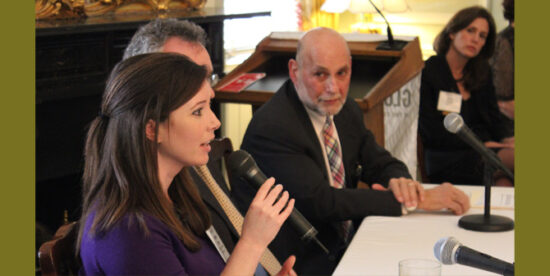
An Interview with Katherine Brown, Executive Director of the United States Advisory Commission on Public Diplomacy, U.S. Department of State
Can you give us a brief overview of the Commission’s role and goals?
The U.S. Advisory Commission on Public Diplomacy is a bipartisan body, authorized by Congress, to appraise all U.S. government activities that seek to understand, inform, and influence foreign audiences as well as to build support for those same activities. We are essentially an autonomous office within the State Department with a small staff, in addition to seven members who are appointed by the President and confirmed by the Senate. While the staff is full-time, the Members serve on a part-time basis and live throughout the U.S., representing a cross-section of expertise in global communications and engagement.
What are some of the key priorities during 2014 and 2015?
While the Commission has a more than 65-year history, it went on a 19-month hiatus from December 2011 to July 2013. Congress brought it back to life in 2013 with a specific mandate to clarify the State Department and Broadcasting Board of Governors’ worldwide public diplomacy and broadcasting activities, and to look at how we evaluate those activities’ impact. We’ll be delivering that report to Congress in late 2014.
Public diplomacy has never been more relevant to how the U.S. engages the world.
We also have the privilege of advocating for U.S. government officials who work in public diplomacy and broadcasting. In 2014 and 2015, the Commission will convene stakeholders in and outside of government to determine ways to modernize public diplomacy policies, laws, tools, structures, and training to ensure it adequately bolsters our national security. For instance, this summer, we are launching a project with several partners to explore how we can support officials engaging foreign publics in high threat environments, drawing on the lessons learned from such close State Department, Defense Department, and U.S. Agency for International Development collaboration after 9/11.
What are the some of the overarching trends in the U.S. government around public diplomacy?
Traditional and public diplomacy have converged. You cannot carry out our defense, diplomacy, or development goals without thinking of people—of the civil society and religious leaders, the media professionals and social media users, the entrepreneurs and businesswomen and men, and the activists and aspiring politicians everywhere. The Cold War sparked a public diplomacy mission to encourage liberal democracies; the September 11th attacks emphasized the importance for public diplomacy to help counter violent extremism. Today, in 2014, we’re in a new foreign policy realm where non-governmental officials, or non-state actors, will increasingly shape the international system and decide the success of U.S. foreign policy goals. This also means that engaging foreign publics is a whole-of-government issue. Public diplomacy has never been more relevant to how the U.S. engages with the world.
What are some of the biggest challenges the Commission faces?
The Commission has a large congressional mandate with a very small office to see it through. There are so many experts to learn from and offices to visit – and that’s just in Washington. We’re aiming to collect as many insights as possible from academics, private sector leaders, and the citizens and volunteers who represent America and live throughout the country (like the Global Ties network). We also need to learn from our public diplomats in the field, and the global citizens they are trying to reach. Our whole-of-government and worldwide mandate from Congress means we have to choose our projects wisely so we can produce well-timed research that affects how our leaders think about public diplomacy’s role in national security, and not become overwhelmed.
Our citizens are everything to U.S. public diplomacy efforts.
What role do you see citizens playing in our nation’s public diplomacy efforts?
Our citizens are everything to U.S. public diplomacy efforts. Whether it be welcoming exchange students or short-term visitors into their homes, or traveling abroad to learn about a new culture, most of the world comes into contact with the United States through us. I grew up with exchange students in my home in Los Altos, California, and I became one in Denmark when I was 16-years-old. Those experiences profoundly affected my worldview and humbled me, as similar experiences did for many of my friends and colleagues. When you hear about amazing individuals like Wazhma Sadat, an Afghan woman who participated in a State Department-sponsored exchange program as a teenager, recently graduated from Yale University, and founded Kamyab Afghanistan, a consulting and marketing firm that empowers Afghan women entrepreneurs, I also think about her original host family in Florida. They didn’t just welcome Wazhma into their home, they helped shape Afghanistan’s future. That’s an incredibly powerful act.
What role do you see our network playing in our nation’s public diplomacy efforts?
You cannot carry out our defense, development or diplomacy goals without thinking of people.
Part of the Commission’s value is harnessing the expertise of people who work in public diplomacy, officially and unofficially. We’d love to hear from you on what you think is and is not working when it comes to official U.S. public diplomacy activities. (You can e-mail us at pdcommission@state.gov!) Ensuring that the Global Ties network, too, continues to thrive, is an enormous boon to the Commission’s larger advocacy work to make sure the American public knows how central public diplomacy is to U.S. foreign policy. Thank you for all that you do.
